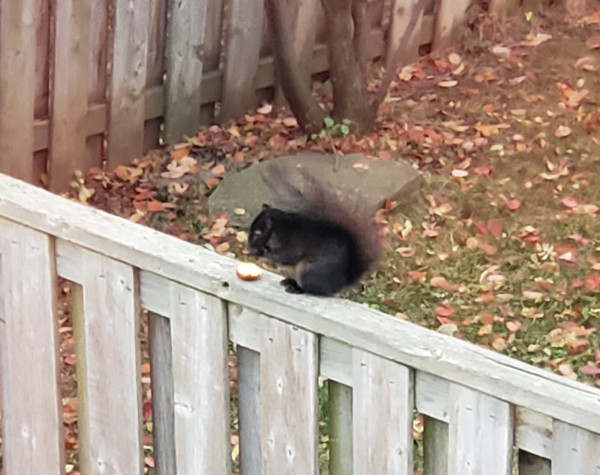Don’t Be Like a Squirrel Hiding Nuts With Project Lessons!
 There are so many project lessons to learn and it’s easy for them all to get lost in the shuffle. As weather gets colder, it is common to see squirrels digging holes to bury nuts and other food items to feed themselves when resources becomes scarce during winter time. But given the volume of nuts which are required to sustain squirrels through the long winter months and the large areas covered by an average squirrel, they often end up forgetting where they have buried all of their treats. While observing the little fellow I captured in the photo above, I was reminded that we are not so different from our furry friends.
There are so many project lessons to learn and it’s easy for them all to get lost in the shuffle. As weather gets colder, it is common to see squirrels digging holes to bury nuts and other food items to feed themselves when resources becomes scarce during winter time. But given the volume of nuts which are required to sustain squirrels through the long winter months and the large areas covered by an average squirrel, they often end up forgetting where they have buried all of their treats. While observing the little fellow I captured in the photo above, I was reminded that we are not so different from our furry friends.
Whether we capture lessons over the life of a project or wait till the end of a phase or the project as a whole, we frequently end up forgetting most of the lessons we have foraged.
On this page:

Squirrels will eat a few nuts while they are in the process of gathering them. In the same manner, there will be certain lessons which we can implement right away.
But what of the remainder?
If we just store them in a repository or, worse yet, in standalone documents or distributed Wiki pages, we are no better than squirrels who have forgotten where they have buried their nuts.
3 Strategies For More Effective Learning
Thankfully, unlike squirrels who are unable to invent and use GPS-based nut finders, we do have a few options:
- Enhance our standards by incorporating identified lessons. This option works well as there is no need for practitioners to search for lessons but over time it could result in overly prescriptive, bloated standards.
- Share lessons in community of practice meetings. One approach would be to leverage the oral traditions of storytelling from our ancestors by taking dry, theoretical lessons and make them come to life.
- Develop playbooks or other types of practice-based learning offerings for practitioners. These would offer identified lessons as options but not as prescription.
Putting the “learned” back in lessons learned begins with doing a better job of learning from the lessons we have previously identified.
To read more blogs by Kiron Bondale, visit his blog.
Studying for the PMP Exam?
Upcoming PMP Certification Training – Live & Online Classes
| Name | Date | Place | |
| PMP Certification Training | May 20,21,22,23 8:30am-6:00pm | Columbus, OH | View Details |
| PMP Certification Training | Jul 22,23,24,25 8:30am-6:00pm | Columbus, OH | View Details |
| PMP Certification Training | Apr 29-May 2 & 6-9 8:00am-12:30pm | Online - Eastern Standard Time (EST) | View Details |



 New Horizons
New Horizons
 Project Management Academy
Project Management Academy
 Six Sigma Online
Six Sigma Online
 Velopi
Velopi
 Watermark Learning
Watermark Learning
 Login
Login



 New Horizons
New Horizons
 Project Management Academy
Project Management Academy
 Velopi
Velopi
 Six Sigma Online
Six Sigma Online
 Watermark Learning
Watermark Learning